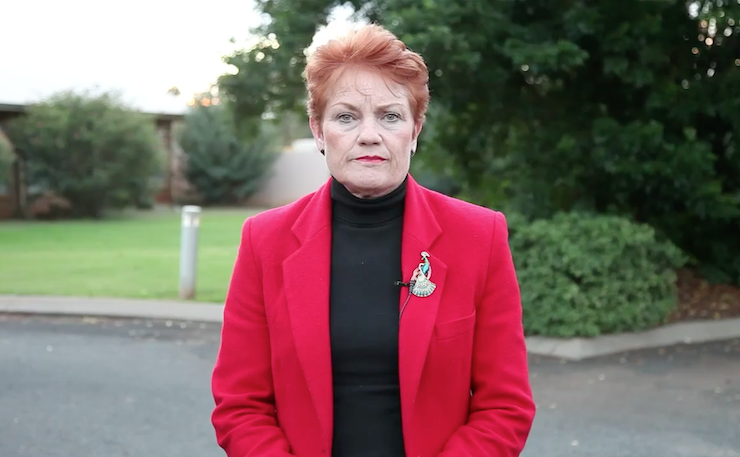Those who have made a life in Australia are forced to watch atrocities against Muslims in their homelands, while simultaneously fending off the bigotry of the anti-Islam movement here, writes Sarah Ali.
Australia faces a problem. The election has seen the return of Pauline Hanson, who used the fear surrounding international terrorism to oversimplify complex issues, garner media attention, and trigger a populist movement against the religion of Islam. This has inturn alienated Australia’s Muslim population from the debate and prevented them being an active part of the solution.
The first step to protect Australians from the threat of terrorism would be to reflect on decisions we have made in the past as a result of a fear of the “other,” which could have contributed to the current problem.
The release of the damning Chilcot report into the illegal invasion of Iraq, which were tainted by bigotry and scaremongering, was a timely reminder of this. For those Muslims whose countries of birth were destroyed by terrorist group Daesh (also known as ISIS), following the Iraq war, the timing of the release of the Chilcot report was salt on their wounds.
Many of those who had to watch their families being killed by Daesh in the Middle East also had to endure being labelled as the problem in Australia, thanks to loud attacks against them by the likes of Pauline Hanson. The Australian Iraqi Muslim community has had to watch helplessly for years as many of their family members were murdered by Daesh following the illegal invasion of Iraq, and the anti-Islam movement has left them feeling alienated and alone in their grief. Labelling the religion of Islam as a dangerous political ideology has thus been a callous attack on devout Muslims who have been hit by terrorism, and who reject terrorist ideology as un-Islamic.
Pauline Hanson’s anti-Islamic rhetoric is sidelining the views of the majority of Muslims who have successfully integrated into Australian society. While any comments made by her are splayed all over the news, the voices and efforts of everyday Muslims are becoming harder to be heard. As a Muslim woman who has fought for the rights of women in Muslim communities, facilitated inter-faith dialogues, and worked hard to empower young Muslims to engage in mainstream Australian life, my actions are now being eclipsed by the anti-Islamic rhetoric that is being forced onto Australians by self-serving politicians.
The promotion of one-sided arguments in the media spewed out by fear mongering politicians regarding the dangerous influence of “Islam” has also been difficult to bear for those Muslims who have family overseas risking their life for democracy. The defeat of Daesh in Fallujah was carried out by forces made up predominantly of Shia Muslims. However, there was little to no coverage of this in Australian media. The dismissal of the influence of religion when Muslims engage in anti-terrorism activities and in the protection of democracy means that a false picture is painted in the minds of Australians when it comes to Islam.
For Australian Muslims, it is also disheartening to know that despite numerous reports in the media that ISIS has made millions of dollars by selling oil of the lands they have stolen, and treat the local population with sadistic brutality, Islam is still regarded as the motivating factor for their actions, rather than greed, money or power. In fact, these terrorist are only labelled and accepted as “Islamic” by Western countries. In countries which have majority Muslim populations, and in which Muslims are specifically targeted (such as the recent bombings in Iraq and Saudi Arabia targeting Muslims observing the holy month of Ramadan) these actions are called out for what they are: politically motivated terrorist activities. To those Muslims, as well as mainstream Australian Muslims, such individuals are using Islam as a scapegoat for their own interests, and any other justifications simply carry no weight.
However, by specifically choosing to only acknowledge the interpretation of Islam as provided by terrorists, Pauline Hanson and her supporters are legitimising the actions of these terrorists and empowering them to continue using the name of Islam for evil. This can potentially have a devastating effect on young, troubled, and marginalised Muslim youth who lack the ability to make informed opinions about complex issues including different religious interpretations. Hence, whether knowingly or not, such politicians are reducing the influence Islamic leaders have in promoting social harmony.
All Australians have a right to voice their opinions and concerns, however, those who wish to lead us have an added responsibility, and that is to promote sincere and genuine discourse that is in the best interest of all Australians. What we have instead seen is the successful use of bigoted arguments, oversimplified slogans, and policies which aim to keep us in the same cycle of violence that was created following the illegal invasion of Iraq.
To break free from the cycle will require self-motivation from average Australians to always question the motives of politicians when their campaigns are driven by emotional appeals and fear of “the other”, and to band together when law abiding members of society are sidelined.
Donate To New Matilda
New Matilda is a small, independent media outlet. We survive through reader contributions, and never losing a lawsuit. If you got something from this article, giving something back helps us to continue speaking truth to power. Every little bit counts.





